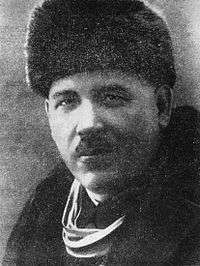Demyan Bedny
Yefim Alekseevich Pridvorov (Russian: Ефи́м Алексе́евич Придво́ров, IPA: [jɪˈfʲim ɐlʲɪˈksʲejɪvʲɪtɕ prʲɪˈdvorəf] (![]()
![]()
Demyan Bedny | |
|---|---|
 | |
| Born | April 13, 1883 Kirovohrad Oblast, Russian Empire |
| Died | May 19, 1945 (aged 62) Moscow, Russian SFSR, Soviet Union |
| Notable awards | Order of Lenin |
Life
Efim Pridvorov was born to a poor family in Hubivka village, in Kherson Province, in Ukraine. At the age of seven, his father took him to live in Elizavetgrad, (Kirovohrad) but six years later was sent back to his home village to live with his mother "in extreme poverty".[1] When he was 14, his father secured him a paid-for place in a feldsher training college in Kiev. This was followed by four years of military service. In 1904, he entered the philological and historical faculty of Petersburg University. His university years coincided with the heady times of the 1905 Revolution, and Pridvorov, like most students, became an ardent supporter of the revolution. From 1911 he began to be published in Communist newspapers, such as Pravda, and in 1912 he joined the Russian Social Democratic Labour Party (Bolsheviks). Also in 1911, he published the poem "Of Demyan Bedny", which led to him being known by that name, and began a private correspondence with Vladimir Lenin which was said to develop into a long-lasting personal friendship. His first collected works were published in Basni (Fables) in 1913. During World War I, he once again saw service as a feldsher and was decorated.
He was a steadfast supporter of the Bolshevik cause throughout the Russian Revolution and Civil War, writing agitprop from the frontlines. For this he was decorated with the Order of the Red Banner in 1923, followed by the Order of Lenin in 1933. In the 1920s and 1930s, he was very popular and variously supported by the Soviet regime. The town of Spassk, Penza Oblast was even renamed Bednodemyanovsk in his honour. He was the only writer to be allocated rooms in the Kremlin. His first political setback came in December 1930, when two of his historical poems were censured by the Central Committee. He wrote a plaintive letter to Stalin asking, and received a long reply accusing him of having insulted the Russian working class. Stalin also disliked a play that Bedny had written in 1932 about the Red Army, calling it "mediocre".[2]
In September 1932,due to a report stating Bedny's debauched life during a CPSU Poliburo meeting, Stalin decided to evict Bedny from his Kremlin apartment. He was relocated to Rozhdestvensky Boulevard, which he called a rat's barn. He told the poet Osip Mandelstam that he had been reported by a secretary who had heard him complain that Stalin left grubby finger marks on books borrowed from Bedny's private library,[3] but it appears that Bedny's real offence was that his writings were highly critical of Russia's imperialist past, whereas Stalin, though he was not a Russian, "nevertheless grasped that Russian nationalism was the glue that held the Soviet Union together".[4] In November 1936 the Politburo condemned Bedny's opera The Bogatyrs for its "antihistorical and mocking depiction of Old Russia's acceptance of Christianity."[5] He tried to regain favour with verses virulently attacking prominent victims of the Great Purge. His poem published in Pravda on 21 August 1936, to mark the show trial of Grigori Zinoviev and others, was headed 'No Mercy'. On 12 June 1937, he published a 54 line poem celebrating the previous day's announcement that Marshal Tukhachevsky and other Red Army commanders had been arrested, which included all of their names in a rhyming scheme.[6] Nonetheless, in 1938 Bedny was stripped of membership in the Communist Party and the Union of Soviet Writers, and in 1941, Stalin remarked to Georgi Dimitrov "ten volumes of verse by Demyan Bedny are not worth one poem of Mayakovsky's"[7] but slowly he regained the favour of Stalin through the years of World War II. His poem commemorating the Soviet victory was published in Pravda on May 3, 1945. Bedny died two weeks later, on May 19.
Trivia
- Bedny's caustic anti-religious poem New Testament without defects (Новый Завет без изъяна) may have inspired Mikhail Bulgakov's The Master and Margarita as a rebuttal.[8] In addition, his character was a prototype for Mikhail Berlioz and Bezdomny (Homeless) was a parody on Bedny's pseudonym.[9] Bulgakov did not normally take pleasure in hearing that someone had been denounced, but made an exception when Bedny ran into trouble in 1938. "He's not going to be chortling over anyone else. Let him feel it for himself," he said.[10]
- Bedny witnessed Fanny Kaplan's execution.
- Bedny amassed one of the largest private libraries in the Soviet Union (over 30.000 volumes), from which Stalin was known to borrow books on occasion.
- According to Nikita Khrushchev's memoirs, Bedny was his favourite poet.
Sources
- Bukharin, N.I. et al, (editors) (1927). Bolsh'shaya Sovetskaya Entsiklopediya, vol 5. Moscow. p. 171.CS1 maint: extra text: authors list (link)
- McSmith, Andy (2015). Fear and the Muse Kept Watch. New York: The New Press. pp. 223–224. ISBN 978-1-59558-056-6.
- Mandelstam, Nadezha (1971). Hope Against Hope, A Memoir. London: Coll;ins and Harvill. pp. 26. ISBN 0 00 262501 6.
- McSmith, Andy. Fear and the Muse Kept Watch. p. 223.
- McSmith, Andy. Fear and the Muse Kept Watch. p. 224.
- Conquest, Robert (1971). The Great Terror. London: Penguin. pp. 162, 277.
- Dimitrov, Georgi (2003). The Diary of Georgi Dimitrov 1933-1949. New Haven: Yale U.P. p. 144. ISBN 0-300-09794-8.
- http://www.lib.ru/BULGAKOW/master97_engl.txt Archived 2007-01-27 at the Wayback Machine (see footnote 4)
- http://alumni.iubip.ru/kolganov/personaji/b/b.htm Archived 2007-02-20 at the Wayback Machine (in Russian)
- McSmith, Andy. Fear and the Muse Kept Watch. p. 224.
External links and references